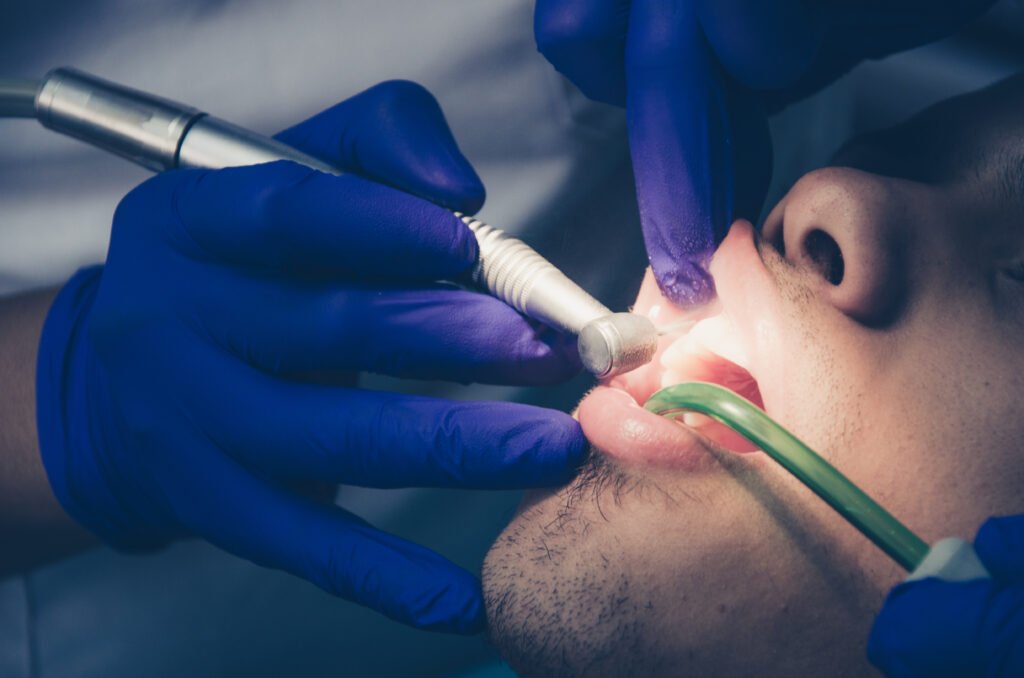Understanding Tooth Nerve Pain
Tooth nerve pain can feel sharp, sudden, or like an electric shock that stops you in your tracks. It happens when the inner dental nerve the pulp becomes irritated or exposed. At Dental Made Easy, serving Queens, Brooklyn, Astoria, and New Hyde Park, we often meet patients who describe a jolt or lingering ache that worsens with hot, cold, or sweet foods.
Our goal is simple: help you understand what’s causing that nerve pain and provide lasting relief.
What Causes Tooth Nerve Pain?
The nerve inside a tooth can become sensitive or inflamed for several reasons:
- Tooth decay: Cavities that reach deep layers of the tooth.
- Cracked or broken teeth: Even hairline fractures can expose a nerve.
- Worn enamel: Aggressive brushing or grinding wears away protection.
- Dental trauma: An injury can bruise or sever the nerve.
- Recent dental work: Temporary inflammation may follow deep cleaning or fillings.
- Gum recession: Exposed roots make teeth highly sensitive.
When these problems aren’t treated early, they can lead to an exposed nerve in the tooth, a condition that needs prompt professional attention.
Recognizing the Symptoms of a Damaged Dental Nerve
Knowing what nerve pain feels like helps you act quickly before it worsens. Common symptoms include:
- Sudden, shooting nerve pain in tooth
- Tingling or electric shock feeling in tooth when you bite or sip hot/cold drinks
- Dull, throbbing pain that spreads to the jaw or ear
- Pain that lingers after temperature changes
- Discoloration of a tooth (a sign of a dying nerve)
- Sensitivity while brushing or eating
If you experience any of these, visit Dental Made Easy at the nearest location Queens, Brooklyn, Astoria, or New Hyde Park for a same-day evaluation.
Exposed Tooth Nerve: Why It Hurts So Much
A tooth exposed nerve leaves the pulp unprotected. Every sip of coffee or bite of ice cream sends pain signals straight to the brain.
In most cases, an exposed nerve won’t heal by itself. If left untreated, it can cause infection, swelling, or even tooth loss.
Professional treatment may include:
- Fluoride gel or desensitizing varnish
- Protective filling or dental crown
- Root canal treatment to remove infected pulp and seal the tooth
- Extraction and replacement, if the damage is beyond repair
Can Dental Nerve Damage Heal on Its Own?
Patients often ask, “Can dental nerve damage heal naturally?”
If inflammation is mild, the nerve may recover once the cause (like grinding or a small cavity) is addressed. However, once the nerve becomes infected or dies, it cannot regenerate on its own. A root canal or nerve therapy is then required to save the tooth.
How to Stop Tooth Nerve Pain at Home
While waiting to see your dentist, you can manage pain safely at home with these steps:
- Rinse with warm salt water to reduce inflammation.
- Use sensitive-teeth toothpaste containing potassium nitrate.
- Avoid trigger foods ice, soda, citrus, sweets, and hot drinks.
- Apply a cold compress on the cheek for 10–15 minutes.
- Take over-the-counter pain relievers like ibuprofen (as advised).
These remedies offer tooth nerve pain relief temporarily but do not replace professional dental care.
Home Remedy for Broken Tooth with Exposed Nerve
If a tooth breaks and exposes the nerve:
- Cover the area with clean gauze.
- Avoid eating on that side.
- Apply a small amount of dental wax (available at pharmacies).
- Do not use home glue or DIY fillers.
Contact your dentist immediately. We offer emergency appointments, including evenings and Sundays, across all four locations.
Understanding the Electric Shock Feeling in Your Tooth
That “electric shock” or zapping sensation happens when stimuli reach the nerve directly through tiny openings in enamel or dentin. It often indicates nerve exposure or nerve damage in tooth.
If you feel sudden shocks while chewing or brushing, schedule a dental visit right away. Early treatment can prevent infection and protect your natural tooth.
When Is a Root Canal Needed for Nerve Pain?
A root canal becomes necessary when decay or trauma has reached the pulp.
During the procedure, your dentist:
- Removes infected tissue.
- Cleans and disinfects the inner chamber.
- Fills and seals the tooth to prevent reinfection.
Root canals are safe, painless, and effective at eliminating tooth nerve pain permanently while saving your tooth.
How Can You Kill a Nerve in a Tooth Safely?
The phrase “kill a nerve” might sound extreme, but it simply refers to removing an infected or dead nerve through a controlled dental procedure.
Attempting to “kill” a nerve using online hacks or household chemicals is extremely dangerous.
Our dentists use advanced anesthesia and rotary technology to remove nerve tissue precisely and restore the tooth’s structure without discomfort.
Tooth Nerve Pain Relief: Professional Treatment Options
When home remedies stop working, these professional solutions provide lasting relief:
- Desensitizing treatment: Fluoride varnish or sealants for minor exposure.
- Filling or Crown: To protect cracked or decayed teeth.
- Root Canal Therapy: For infected or dying nerves.
- Extraction and Dental Implant: When the nerve and tooth cannot be saved.
At Dental Made Easy, our skilled team evaluates the exact cause and tailors a treatment plan to restore comfort and confidence.
Nerve Damage and Healing Process
After treatment, mild sensitivity may persist for a few days as the tissue heals.
Here’s what helps recovery:
- Maintain good oral hygiene (soft-bristle toothbrush + fluoride toothpaste).
- Avoid extreme temperatures in food and drink.
- Attend your follow-up appointments for monitoring.
- If pain increases after a week, contact us for reevaluation.
With timely care, most patients regain full comfort and function within days.
Why Choose Dental Made Easy for Tooth Nerve Relief
Across Queens, Brooklyn, Astoria, and New Hyde Park, Dental Made Easy is known for same-day appointments, gentle care, and advanced dental technology.
We provide:
- Comprehensive dental services under one roof (general, cosmetic, implant, and emergency).
- Digital X-rays and 3D imaging for accurate nerve assessments.
- Flexible hours, including evenings and Sundays.
- Insurance-friendly options (PPO accepted).
- Experienced team of dentists dedicated to pain-free treatments.
Whether you’re suffering from mild sensitivity or severe tooth nerve pain, our team is ready to restore your smile comfortably.
Final Takeaway: Get Lasting Relief from Tooth Nerve Pain
Tooth nerve pain rarely disappears on its own. If you’re experiencing discomfort, visit your nearest Dental Made Easy location in Queens, Brooklyn, Astoria, or New Hyde Park.
Our experienced dentists will identify the cause, offer same-day relief, and create a personalized treatment plan.
Don’t let nerve pain control your life, book your appointment today and take the first step toward a pain-free, confident smile.
FAQs – Answer Engine Optimized
- How do I stop nerve pain in my tooth fast?
Avoid hot or cold foods, rinse with salt water, use toothpaste for sensitive teeth, and apply a cold compress on your cheek. For lasting relief, schedule a visit at Dental Made Easy our team can identify the exact cause and ease the pain quickly. - Can a tooth nerve heal on its own?
Mild inflammation may heal if the irritation is removed early, but an exposed or infected nerve usually needs professional treatment such as a root canal. The dentists at Dental Made Easy can evaluate whether the nerve can be saved or needs care. - Is tooth nerve pain a dental emergency?
Yes. Continuous nerve pain can indicate infection or nerve damage. Early treatment prevents abscesses and tooth loss, so it’s best to contact a dental clinic as soon as the pain begins. - What is the best home remedy for a broken tooth with an exposed nerve?
Cover the exposed area with clean gauze or dental wax, avoid chewing on that side, and visit a dentist right away. Quick professional care helps prevent infection and protects the tooth structure. - Why do I feel an electric shock in my tooth?
That “electric shock” feeling usually means the nerve is exposed or irritated. It may result from enamel erosion, tooth decay, or a crack. Getting a dental check-up ensures the issue is treated before it worsens. - How much does tooth nerve treatment usually cost?
Costs vary depending on whether you need a filling, crown, or root canal. Dental Made Easy accepts most PPO insurance plans and offers flexible options to make treatment accessible for all patients. - Do you offer same-day treatment for severe tooth pain?
Yes. Same-day and emergency appointments are available including evenings and weekends so patients don’t have to live with nerve pain longer than necessary. - Which locations provide treatment for nerve pain and sensitivity?
All Dental Made Easy locations in Queens, Brooklyn, Astoria, and New Hyde Park are equipped to diagnose and treat nerve-related pain with modern technology and compassionate care.


